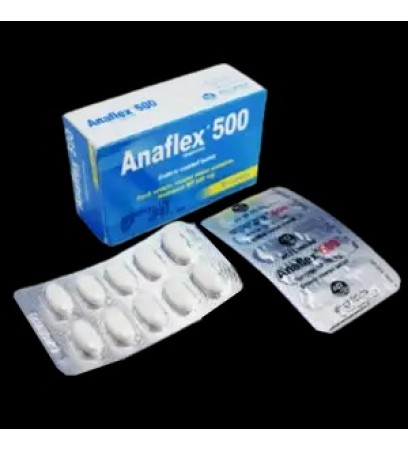Anaflex 500 Tablet
- Brand:ACI Limited
- Product Code: Naproxen Sodium 500mg
- Availability: In Stock
-
8.61Tk.
Indications
Anaflex® is indicated for the treatment of rheumatoid arthritis, osteoarthritis, ankylosing spondylitis, juvenile rheumatoid arthritis, acute gout and acute musculoskeletal disorder (such as sprains and strains, direct trauma, lumbosacral pain, cervical spondylitis, tenosynovitis and fibrositis), migraine, post-operative pain and dysmenorrhoea.
Pharmacology
Naproxen is an anti-inflammatory, analgesic, and antipyretic non-steroidal anti-inflammatory medication (NSAID). It is quickly absorbed from the gastrointestinal tract and has a bioavailability of 95%.
Dosage & Administration
Naproxen Tablet-
- Rheumatoid arthritis, osteoarthritis and ankylosing spondylitis: The usual dose is 500-1000 mg daily in two divided doses after meals.
- Management of pain, primary dysmenorrhea, acute tendonitis & bursitis: Recommended starting dose is 500 mg followed by 500 mg every 12 hours or 250 mg every 6-8 hours. The initial total daily dose should not exceed 1250 mg and thereafter, the total daily dose should not exceed 1000 mg.
- Acute gout: Recommended starting dose is 750 mg followed by 250 mg every 8 hours until the attack has subsided.
Naproxen Suspension-
- For Juvenile rheumatoid arthritis: The usual dose for children over 2 years is 10 mg/kg/day given as two divided doses at 12-hours intervals. Therapy in children under 2 years of age is not recommended.
Naproxen Gel-
- Is to be applied 2-6 times a day as required and is not recommended for use in children.
Interaction
ACE inhibitors: diminish the antihypertensive effect of ACE inhibitors.
Antacids & Sucralfate: delay the absorption of Naproxen.
Aspirin: increase adverse effects.
Diuretics: reduce the natriuretic effect of Furosemide and Thiazides.
Methotrexate: enhance the toxicity of Methotrexate.
Warfarin: increase the risk of GI bleeding.
Selective Serotonin Reuptake Inhibitors (SSRI): increase the risk of GI bleeding.
Contraindications
Naproxen is contraindicated in patients’ active peptic ulceration, hypersensitivity to naproxen or naproxen sodium formulations, aspirin/other NSAIDs.
Side Effects
Most frequently reported side effects include following:
- Gastrointestinal: Heartburn, abdominal pain, nausea, diarrhea, dyspepsia.
- Central Nervous System: Headache, vertigo, drowsiness.
- Dermatological: Pruritus (itching), purpura.
- Cardiovascular: Edema, palpitation.
- Others: Visual disturbances, hearing disturbances.
Pregnancy & Lactation
The safety of naproxen administration during pregnancy and for use in nursing mothers has not been established. Therefore, the possible hazards should be weighed against the potential benefits.
Precautions & Warnings
Naproxen should be used with care in patients with a history of GI disease, asthma, or allergic disease, impaired renal and hepatic function. Naproxen decreases platelet aggregation and prolongs bleeding time.
Therapeutic Class
Non-steroidal anti-inflammatory drugs (NSAIDs), drugs for osteoarthritis, drugs for rheumatoid arthritis (NSAIDs)
Storage Conditions
Keep the temperature below 30°C and keep it away from light and moisture. Keep out of children's reach.
Pharmaceutical Name
ACI Limited
Tags: Anaflex 500 Tablet

